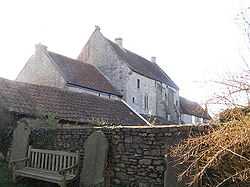Saltford Manor House
| Saltford Manor | |
|---|---|
 | |
| Location | Saltford |
| Coordinates | 51°24′07″N 2°27′38″W / 51.40194°N 2.46056°WCoordinates: 51°24′07″N 2°27′38″W / 51.40194°N 2.46056°W |
| Built | 12th century |
Listed Building – Grade II* | |
| Designated | 27 February 1950[1] |
| Reference no. | 485125 |
 Location of Saltford Manor in Somerset | |
The Saltford Manor is a stone house in Saltford, Somerset, near Bath, that is thought to be the oldest continuously occupied private house in England,[2][3][4] and has been designated as a Grade II* listed building.[1]
The original Norman construction was by William Fitz Robert, 2nd Earl of Gloucester,[1] and was built on an estate owned at the time of the Domesday Book by Geoffrey de Montbray the Bishop of Coutances.[5] It is contemporary with nearby Horton Court which was a prebendary house, therefore it is likely that Saltford had an association with Keynsham Abbey, and has long been associated with St Mary's Church.[1]
In 2003, Saltford Manor was the winner of a contest sponsored by Country Life to find the "oldest continuously inhabited house in Britain". There were hundreds of entrants, many eliminated because they had been built as ecclesiastical buildings and only become available in the housing market after Henry VIII dissolved the monasteries. Other very old dwellings were eliminated because they are now used as shops or museums.[3] After winning the contest, its resident at the time James Wynn (Grange Hill), wrote a non-fiction history book of the Manor, The House That Jack Built: The Story of the Oldest Inhabited House in Britain.[6] It described his love for the site and how he restored it to its current state in 1997.
In 2008, the Saltford Manor was put up for sale.[7] It sold on 27 August 2010 for 1,275,000 pounds.[8]
Architecture
Architectural historian John Goodall believes the house has details, particularly in the ornate windows, which date it securely to before 1150, and probably to around 1148, the completion date of Hereford Cathedral, which has some similarities, notably a Norman arch etched with diamond markings that are similar to features in the Cathedral.[3][4]
Nikolaus Pevsner points to the rare survival of a fragment of a medieval painting as an important feature of the house.[9] Other historically significant details include a Norman window in the main bedroom, a 17th-century kitchen, and an "imposing" Tudor fireplace in the sitting room.[4]
Architectural historian Anthony Emery believes that the house originally consisted of a large single room on each floor with a vaulted chamber on the ground floor.[10]
Major remodelling was carried out in the 17th century being undertaken during the ownership of two generations of the Flower family.[1] The dovecote next to the barn in the grounds dates from this period.[11]
The badly deteriorated interior was completely refurbished in the 1990s by owners James and Anna Wynn.
References
- ↑ 1.0 1.1 1.2 1.3 1.4 "Saltford Manor". Images of England. Retrieved 2006-11-20.
- ↑ "Oldest occupied house named". BBC News August 2003. 28 August 2003. Retrieved 23 May 2010.
- ↑ 3.0 3.1 3.2 Kennedy, Maev (2003-08-23). "Britain's longest-inhabited dwelling". London: The Guardian. Retrieved 7 March 2010.
- ↑ 4.0 4.1 4.2 Demetriou, Danielle (2003-08-28). "Revealed: Britain's oldest inhabited dwelling". London: The Independent. Retrieved 7 March 2010.
- ↑ Pook, Susan (2003-08-28). "12th century manor is found to be Britain's oldest inhabited home". London: The Telegraph. Retrieved 7 March 2010.
- ↑ Aurum Press Ltd (1 Sep 2007), ISBN 1845132823
- ↑ Haughney, Christine. "A New York Hard-Sell for an Ancient British Home". City Room. New York Times. Retrieved 10 February 2012.
- ↑ "Property details for Saltford Manor, Queen Square, Saltford, Bristol BS31 3EL". Zoopla. Retrieved 10 February 2012.
- ↑ South and West Somerset: Buildings of England. Pevsner architectural guides, Nikolaus Pevsner, Yale University Press, 2003, p. 51
- ↑ Discovering medieval houses, Anthony Emery, Osprey Publishing, 2007, p. 30
- ↑ "Dovecote 5 metres to north of Manor Barn". Images of England. English Heritage. Retrieved 7 March 2010.
Further reading
- Wynn, James (2007). The House That Jack Built: The Story of the Oldest Inhabited House in Britain. Aurum Press Ltd. ISBN 978-1-84513-282-8.